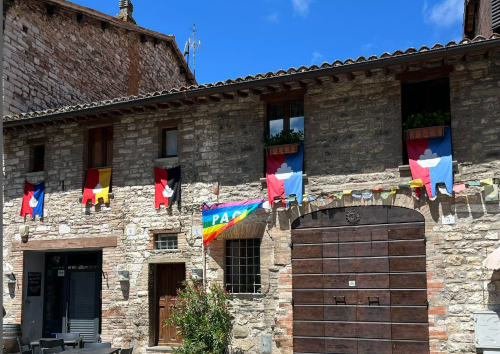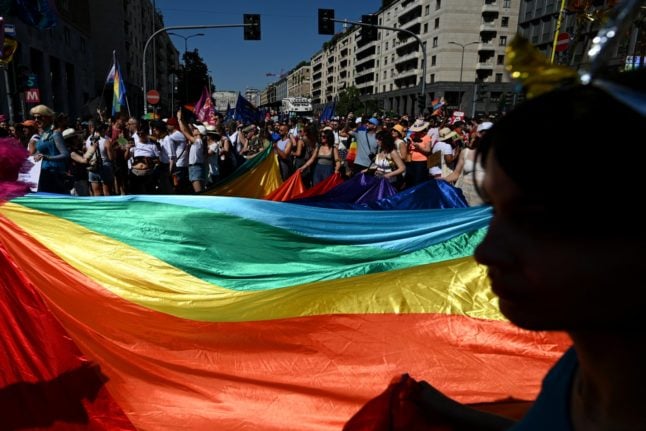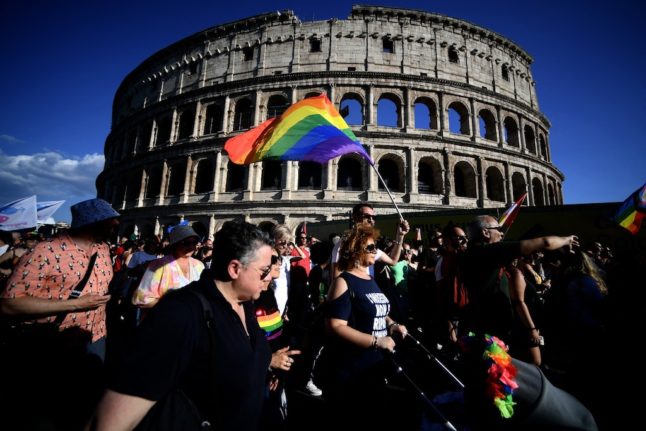Whether or not you can start a family in your country of residence is not a dilemma many people expect to find themselves in. But for some same-sex couples in Italy, that’s precisely their concern.
“When I first moved to Italy in 2015 it was like going back in time. It was an odd experience,” says Tyler Sabin, a US national who moved to Italy from Colorado and has called the country home ever since.
READ MORE: Italy ‘one of the worst countries in Europe’ for gay and trans rights
Tyler, who is in a civil partnership with an Italian, says they were among the first to celebrate a civil union in the town of Vicenza.
“I was here for the milestone of civil unions and remember being part of the protests,” he tells The Local.
“Now, the government refuses to accept anything beyond their standards.”
Civil unions became legal in Italy in 2016, but the law on parental rights for same-sex couples is unclear – and recent moves by the Italian government have made things harder.
The interior ministry last year issued a directive instructing town councils around the country to only put biological parents’ names on birth certificates, and ordered the mayor of Milan to stop legally recognising both parents in same-sex families.
Some same-sex couples say they are now considering leaving the country in order for them both to be recognised as the parents of their child.
Overall, Italy is lagging behind other European countries for gay and trans rights, and was ranked one of the worst on the continent in the latest report by the International Lesbian, Gay, Bisexual, Trans and Intersex Association’s Europe chapter, ILGA-Europe.
“Many gay couples that I know feel like they are just stuck now. There’s very little chance of actually making a family,” Tyler says, adding that even getting his civil union was tough.
“We had to choose Vicenza over our own city, Padua, because the mayor did everything he could to make the ceremony bad. They only offered Wednesday mornings in the divorce room of the city hall when we checked.”
When he first landed in Italy, he lived in Trieste where he says a lot of hate crimes were happening, making it harder for him to be open about his identity. But Tyler is aware he has it marginally easier than some Italians.
“Unfortunately I have several friends who have had worse experiences,” he says. “The most common being friends coming from southern Italy whose family refused to accept their identity and kicked them out.”
Tyler has said his in-laws, his coworkers, and his questura have all been welcoming and accommodating. However, he feels that Italy as a whole could do a lot better.
“I’ve always dreamed of having a family,” he says. “The Italian government has done everything possible to prevent same-sex couples from having any chance of having children.”
“We’ve considered going back to the US just to start a family.”
Further down the east side of the country, in Gubbio, Umbria, are German nationals Kai Klose and Jochen König who have been together for 23 years and married for six.
Klose was a former minister in the state of Hessen in Germany and worked directly on improving LGBTQIA+ rights. He founded the Frankfurt Pride.
The couple moved to Italy earlier on this year after they purchased Bellaugello, which they run as a country house resort for same-sex couples. The house was founded in 2010 and is well-known within the local community.

“We feel really welcome in Gubbio and didn’t expect this level of comfort from a small place,” Jorgen says from his back garden at Bellaugello.
The only time the two have felt uncomfortable was on a trip to South Tyrol a few years ago, he says, where people were watching them having dinner.
“For the rest, we are so happy,” says Kai. “We have just participated in Umbria Pride and there were young crowds, who were very loud and fighting for their rights. It was beautiful to support the young.”
Both Kai and Jochen, like Tyler, recognise how hard it must be for Italian nationals in same-sex relationships.
“I think it is different for us. I recognise that because we are foreign we are treated differently, but I imagine if you grew up here it would be so hard to grow up and so difficult,” Kai says.
Barbara Wickstrand, who moved from the US to Abruzzo last year with her Italian-American wife, says she feels she has had to keep public displays of affection under wraps to be respectful of the country.
Though she has not been made to feel unwelcome, she points out that “we have a lot less rights here than we do at home.”
“We couldn’t get married here and we cannot adopt here, which is ridiculous,” she says. “I hope it changes.”
“However, everyone treats you the same day to day.”
She says she feels comfortable saying she is gay in Italy compared to some of the other countries she has travelled to.
“I did my research though, and I think anyone else in the same situation should do so too before moving,” she advises. “Facebook groups are a huge help in getting to know what a community is like.”
Tyler adds: “Not everywhere is friendly towards LGBTQIA+ people. Do some research and see if there are some communities you can join. I was lucky enough that I found myself in a city that has a large community.”




 Please whitelist us to continue reading.
Please whitelist us to continue reading.
As someone living in a very small town (comune size = 4000) my experiences as living as a same sex couple have been almost universally positive. It would have been nice to have had a perspective from living in a small community in this article.
Hi, we’re glad to hear your experience has been mostly positive, and it is great to hear from someone living in such a small community. If you’d like to share more about your experience please drop us an email: [email protected]
Thanks for reading!